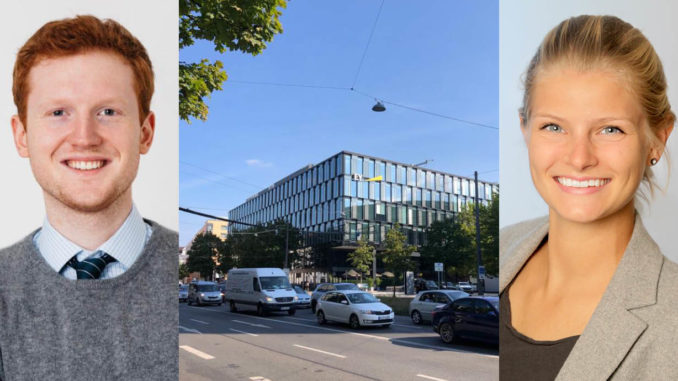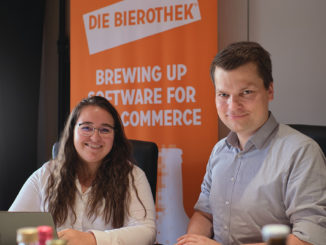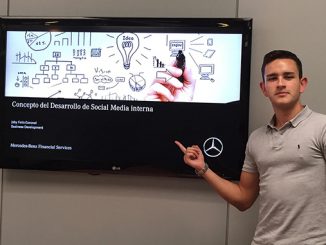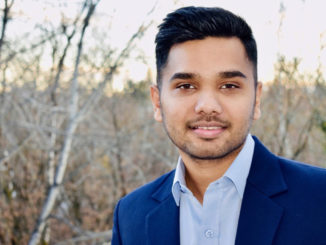
Thanks to Munich Business School’s collaboration with professional services network Ernst & Young (EY), MBS students have had the opportunity to apply for two exclusive internships at EY over the past year. Many students applied for the positions, but it was Caroline Baumann from our Master Innovation and Entrepreneurship program and Maximilian Felmayer from our Master International Business program who were selected for the two internships. Stephanie Stangl, Manager of the Career Center at MBS, met up with the two (now former) MBS students for an interview to discover how their internships at EY went and how their career paths have developed since. Here’s a quick spoiler for you: while they might have completed their internships, Max and Caroline’s EY journeys are far from over.
Stephanie Stangl: Hello Caro, hello Max! You both secured your internships through the collaboration between Munich Business School (MBS) and EY. Could you tell us a little about how it went and why an internship at EY appealed to you?
Maximilian Felmayer: Thank you, Stephanie – we’re delighted to hold this interview with you! You’re right, our internships came about as a result of the close relationship between MBS and EY. Apart from the various talks and discussion forums hosted by and with EY at MBS, there are also a number of highly experienced EY partners and employees who teach at MBS. As a result, EY and MBS are very closely connected. For students, it’s really helpful to be able to make contacts with experienced people from the world of business in the course of your studies. Ultimately, Caro and I were selected following an application process with numerous candidates.
Caroline Baumann: I completely agree with Max. The internship was an incredible opportunity for us, both in terms of what we did and in relation to the company and the people. Looking back, I’m really glad I applied!
Stephanie Stangl: You were both placed in the EY GSA Executive Team. How exactly did you support the team and what were your responsibilities?
Caroline Baumann: Exactly – perhaps we should briefly explain what that means. GSA is a region made up of Germany, Switzerland and Austria. We supported executive management in all kinds of different areas. Our main task was conducting economic analysis on the topic of quantum computing, which is a key area of interest for EY. This is also shown by the EY WaveSpace in Munich, where EY promotes corporate strategies and technologies in a highly collaborative environment. Quantum computing technology is currently the subject of intense debate and promises major breakthroughs in future, which made it particularly exciting and forward-looking to engage with the topic.
Maximilian Felmayer: Our duties were also very varied and included calculating internal KPIs, supporting implementation of corporate strategy and conducting market analyses. We were able to take part in various team meetings, which was a lot of fun and gave us valuable insights. Interaction with other people was very important, particularly in view of the pandemic.
Stephanie Stangl: You’ve mentioned the pandemic, which is actually the subject of my next question. You started work at EY in the midst of the coronavirus pandemic. Did that have an impact on your internship, and if so, how?
Caroline Baumann: We were lucky because we started in the summer of 2020 and the regulations at the time meant that we were sometimes able to come into the office. Towards the end of our internship, however, we worked from home a lot of the time. In this respect, the pandemic did have an effect on our internships. Fundamentally, however, working remotely at EY – just like studying remotely at MBS – worked brilliantly; we were always in (virtual) contact with other people and didn’t have to miss out on interaction with colleagues. Working from home also makes it possible to work more flexible hours, something EY also supports, which was a great help when it came to combining work with our studies and time off.
Stephanie Stangl: You’ve now finished your internships at EY. What lessons and insights were you able to take from the experience?
Caroline Baumann: A whole host of things; we were both able to develop a lot. All in all, I think we took three things away with us. First, the ability to work in a structured and organized manner under time pressure. We learned to coordinate numerous projects and pieces of information at the same time and at a fast pace while still keeping a structured approach – the definition of management in the real world. In addition, we learned to condense information and present it to provide a valuable overview as quickly as possible. We also gained insights into management functions, which was invaluable.
Maximilian Felmayer: Second, we learned to value the people at EY – we met a lot of very impressive individuals. In such a large international company, there are quite simply experts for everything. When you work at EY, you have access to an unbelievably wide network of intelligent people and valuable information. And, last but not least, we obviously learned an unbelievable amount about quantum computing. It’s actually a very promising technology and we’re looking forward to following developments surrounding quantum computing in future.
Stephanie Stangl: How did things progress for you after the internship?
Maximilian Felmayer: We must have made a good impression, because we were taken on in the same team as student employees immediately after our internship. This also allowed us to write our master’s theses at EY. I was so interested in the topic of quantum computing that I made it the focus of my master’s thesis.
Caroline Baumann: In my master’s thesis, I look at how we can measure the progress of strategy implementation. We were recently taken on as full-time employees at EY, so our EY journey isn’t over yet. From this fall, we’ll both start work in the Strategy and Transactions service line. The selection interviews for the positions were really challenging. However, we prepared well and made it through.
Stephanie Stangl: What is EY like as an employer?
Maximilian Felmayer: Once again, there were three things that really made us feel at home at EY. For one, EY strives to accommodate its employees on a personal level, such as through flexible working hours and locations. As a result, we were able to effectively combine our private and work lives. Above all, we received a lot of constructive, direct feedback and praise. We felt – and still feel – appreciated on a personal level.
Caroline Baumann: EY also has a wide range of CPD and social engagement activities. There’s an internal, proprietary platform where you can spend hundreds of hours completing all kinds of training on topics such as data analysis using Power Apps, PowerPoint, Excel and even Photoshop. Furthermore, the EY Ripples program facilitates social engagement. At the end of the day, you can see that EY has a strong interest in ensuring its employees engage with social issues.
Maximilian Felmayer: The third point we’d like to mention is the entire EY team. Of course, we’ve only been able to get to know a fraction of them, but our impression so far is that EY benefits from highly qualified, helpful and intelligent employees. That helped us a lot as newcomers and we felt welcome from the outset.
Stephanie Stangl: What have you been able to take from your time at MBS that helps you in your daily work?
Caroline Baumann: MBS prepared us very well, particularly in terms of coordinating lots of different tasks and topics at the same time – which is project management, really. As we mentioned earlier, we worked on various topics at the same time during our internship. This means you need to be organized and structured in your work and in yourself. Prioritizing is another skill we had to learn. If you work on lots of tasks at the same time, this can sometimes mean that you can’t finish or solve everything you need to. It’s certainly been a learning process. The ability to scrutinize and keep an open, future-focused mindset – skills we honed in numerous courses at MBS – helped us in many of our tasks and often brought us praise. We had dealings with lots of different stakeholders and decision-makers, which meant that we also encountered different opinions. The best solution wasn’t always obvious, especially when it came to politically sensitive tasks. But that’s something you have to be able to handle.
Maximilian Felmayer: Another key lesson: learn to use MS Office programs! Excel and PowerPoint are de facto essentials. But if you can master programs like Power BI and Alteryx, you’ll make a lot of progress very quickly and very easily.
Stephanie Stangl: Finally, what advice would you give to current MBS students looking for an internship?
Maximilian Felmayer: Following on from what I said before: be open to opportunities and be flexible. Build up your knowledge in topic areas that really interest you. There’s a good chance that you’ll be able to apply it in practice, particularly in large companies.
Caroline Baumann: Trust in your abilities and draw confidence from them! You shouldn’t be afraid of the big-name companies Max mentions, as MBS prepares students very well for the world of work, so you have every right to trust in yourself.

After completing your bachelor’s degree, you would like to delve even deeper into the processes of international business administration and specialize in a particular area, such as finance, marketing, or sports business?
Then you will find a broad selection of business master’s programs with different focuses at Munich Business School. In all programs, you’ll benefit from small classes, lecturers from the business world, and outcome-focussed learning that makes it easy to start your career. See for yourself:
Master’s in International Business
Master’s in International Business I Finance
Master’s in Innovation and Entrepreneurship
Master’s in International Marketing and Brand Management
Master’s in Sports Business and Communication



